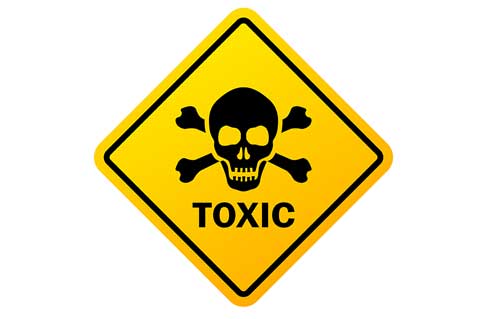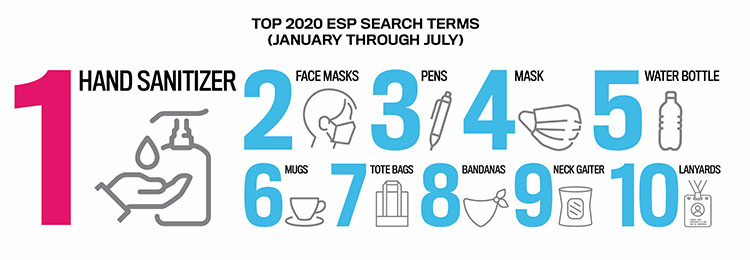August 20, 2020
FDA Issues New Warning About Hand Sanitizers
The agency expanded its list of dangerous or ineffective sanitizers to avoid and raised a new alarm about a toxic chemical to look out for in certain sanitizers.
As reported poisonings from deficient hand sanitizer rise, the U.S. Food and Drug Administration has expanded its list of alleged toxic sanitizers to avoid, raised a new alarm about a chemical to look out for, and warned that some products on the market lack the required germ/virus-killing potency to be effective.

The news is relevant for the promotional products industry. Amid the ongoing coronavirus pandemic, “hand sanitizer” has been the single most searched term through the first seven months of 2020 in ESP, ASI’s database of products from around the promo industry.

The FDA’s list of sanitizers (go here to see the full list) to avoid has now grown to 163 entries. The list includes recent additions like Leafree Instant Sanitizer, which was labeled “edible alcohol.” Distributed by Corgiomed Inc., the sanitizer was made in China by Yangzhou Olande Cosmetic Co. Ltd. Ingesting sanitizer can lead to everything from blindness to death.
Many of the problematic sanitizers on the list were produced at facilities in Mexico. But recently, the FDA also called out sanitizers manufactured in the U.S., including products produced in North Carolina, Ohio, Texas and Utah. On Saturday, SG24 of Bolingbroke, GA, recalled SkinGuard24 – All Day Hand Sanitizer products because they are labeled as containing methanol.
U.S.-made sanitizer that the FDA identified as problematic included: UltraCruz Hand Sanitizing Gel Antimicrobial from Santa Cruz Biotechnology of Texas; Volu-Sol Handrub Sanitizing Solution from Volu-Sol, Inc. in Utah; Always Be Clean Hand Sanitizer and Just Hand Sanitizer Single Use Packs by Open Book Extracts in North Carolina; and Lite ’n Foamy Lemon Blossom Hand Sanitizer and foamyiQ Lemon Blossom Hand Sanitizer from Spartan Chemical Co. Inc. in Ohio.
The FDA is also now cautioning consumers to avoid sanitizers that are labeled to contain ethanol or isopropyl alcohol/isopropanol (which are safe at the correct levels), but have tested positive for 1-propanol, which can be toxic and life-threatening. For example, sanitizer from Harmonic Nature S de RL de MI in Mexico contains 1-propanol, the FDA says.
“Young children who accidentally ingest these products and adolescents and adults who drink these products as an alcohol (ethanol) substitute are most at risk,” according to the FDA. “Ingesting 1-propanol can cause central nervous system depression, which can result in death. Symptoms of 1-propanol exposure can include confusion, decreased consciousness, and slowed pulse and breathing. Animal studies indicate that the central nervous system depressant effects of 1-propanol are 2 to 4 times as potent as alcohol (ethanol).”
Through the third week of July, a CBS report detailed, there had been a 59% spike in calls — more than 18,000 cases — to one of the 55 poison control centers around the U.S. due to various incidents involving hand sanitizer, compared to the same period last year. Almost 12,000 of those cases involved children ages 5 and younger.
Meanwhile, the FDA warned consumers about sanitizers that don’t have a sufficient amount of at least one of two kinds alcohol required to make the product effective. Sanitizer must contain at minimum 60% ethanol or 70% isopropanol (different than 1-propanol) to work and be safe for human use, according to the Centers for Disease Control and Prevention. The FDA identified the below sanitizers as “sub-potent”:
• Alcohol Antiseptic 62% Hand Sanitizer (Quimica Magna de Mexico)
• Bernal (Quimica Magna)
• Datsen (Quimica Magna)
• Derma70 Hand Sanitizer (Asiaticon)
• Clean Humans (DEPQ Internacional)
• CleanCare NoGerm (Precision Analitica Integral)
• Dgreen (DEPQ Internaciona)
• Hand Sanitizer (DEPQ Internacional)
• HF&N (Healthy Food and Nutrition Lab)
• Medically Minded (Asiaticon)
• NeoNatural (Limpo Quimicos)
• OZO (Estrategia Hospitalaria)
• Protz Real Protection Antibacterial (Asiaticon)
• UltraCruz (Santa Cruz Biotechnology, Texas)
• V-KLEAN (Asiaticon)
• Yakana (Grupo Yakana)
Earlier this summer, the FDA told consumers to avoid sanitizer that contains methanol, which can be toxic when absorbed through the skin or ingested. Products may not be labeled as containing methanol, but might still have it. Check the FDA list of suspect sanitizers before making a purchase.
“Consumers who have been exposed to hand sanitizer containing methanol should seek immediate treatment, which is critical for potential reversal of toxic effects of methanol poisoning,” the FDA said in a statement. “Substantial methanol exposure can result in nausea, vomiting, headache, blurred vision, permanent blindness, seizures, coma, permanent damage to the nervous system or death. Although all persons using these products on their hands are at risk, young children who accidently ingest these products and adolescents and adults who drink these products as an alcohol (ethanol) substitute, are most at risk for methanol poisoning.”

Product Hub
Find the latest in quality products, must-know trends and fresh ideas for upcoming end-buyer campaigns.